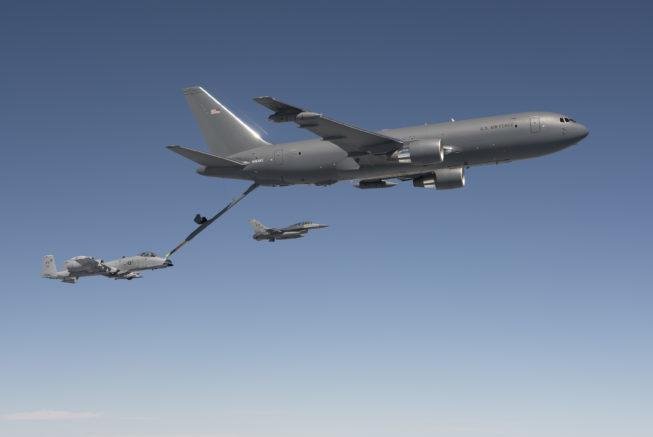A KC-46 Pegasus refuels an A-10 Thunderbolt II with 1,500 pounds of fuel July 15, 2016. The mission was the last of all flight tests required for the tanker’s Milestone C production decision. Photo by John D. Parker/Boeing
Dec. 4 (UPI) -- Boeing will miss its deadline to deliver the first KC-46 tanker to the U.S. Air Force by the end of the year -- an admission that comes a little over month after the company was "very confident" it could meet its self-imposed demand.
The KC-46 Pegasus is a wide-bodied aerial refueling tanker jet being developed for the U.S. Air Force, and it is capable of refueling all U.S. and allied military aircraft capable of mid-air refueling.
"We're not going to be delivering a tanker this year," Leanne Caret, president and CEO of Boeing Defense and Security, told Defense News.
"We are extremely close, we will be delivering [the tankers] in 2018 and there is no doubt in my mind that this is a great franchise for the Boeing Company and we are delivering an incredible capability to the United States Air Force and to the world."
Boeing is required to deliver 18 KC-46s and nine refueling pods by October 2018, a time frame that is already 14 months later than originally planned -- and warnings for further delays have been floated since at least last May.
Under the terms of the deal between Boeing and the U.S. Air Force, the risk of cost overruns during production falls on the defense contractor. Historically, the burden of the fixed-price contract weighs heavy, especially for innovative projects involving military transports that are untested or have undeveloped technologies.
In October, Boeing CEO Dennis Muilenburg gave little insight during a conference call into the cost overruns and penalties acquired by the company, remaining optimistic about Boeing's approach to developing the KC-46 and the company's ability to meet its delivery deadline.
"We remain very confident," Muilenburg said. "The opportunity is measured in hundreds of aircraft. We expect this to be a long-term production and support franchise, one that will add tremendous value for our customers, and the need for the new tankers is very clear. So the fundamentals for the program are strong, the long-term value proposition is very strong."
Defense Secretary James Mattis said Boeing "has been excellent" as it works through the deficiencies of the KC-46 with the U.S. Air Force, though Bloomberg reported he has also said the Air Force is also not planning to accept tankers "that weren't completely compliant with the contract."
The KC-46 budget may become troublesome if Congress decides to pass another long-term continuing resolution, which would tighten funding for defense projects.
Last week, a panel of eight senior military officers from all branches of the U.S. Armed Forces, including the deputy defense secretary for force education and training, told defense industry leaders at the Interservice, Industry Training, Simulation and Education Conference in Orlando, Fla., that the return of sequestration could be catastrophic for the U.S. Air Force.















